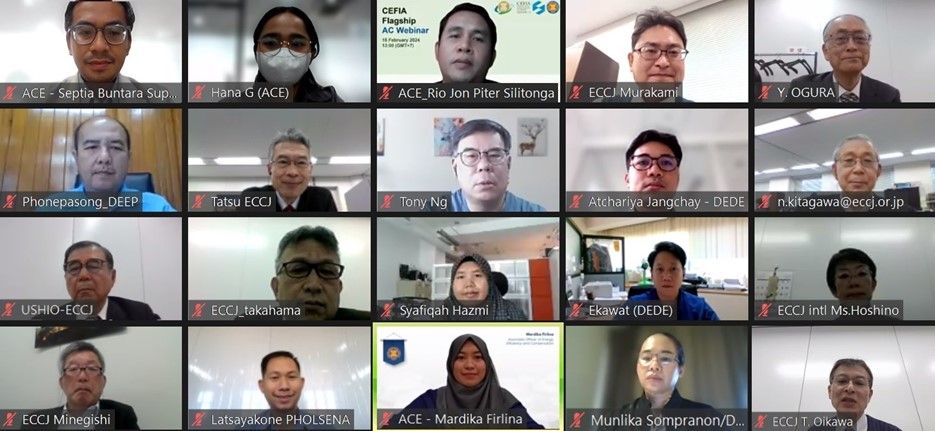Menu

The ASEAN Centre for Energy (ACE), in partnership with the Energy Efficiency Centre Japan (ECCJ) under the ASEAN-Japan Energy Efficiency Partnership (AJEEP), a programme funded by the Ministry of Economy, Trade and Industry (METI) of Japan, hosted a virtual workshop titled “2nd Workshop of the SAEMAS Working Group” on 22 February 2024. This workshop is a follow up meeting of the 1st Workshop of the SAEMAS Working Group, held Online on 24 January 2024.
In response to the growing demand for skilled energy managers in the ASEAN region, the Sustainable ASEAN Energy Management Certification Scheme (SAEMAS) seeks to elevate and unify energy management competencies across member states. By removing professional barriers and facilitating the mutual recognition of qualifications, SAEMAS will streamline professional licensing procedures and promote seamless mobility for energy managers within ASEAN.
Seven ASEAN Member States (AMS) – Lao PDR, Indonesia, Malaysia, Singapore, Philippines, Thailand, and Vietnam – actively participated in the workshop, which was structured across four sessions. Presentations of the country report from AMS representatives on the SAEMAS Working Group’s final comments and recommendations related to the Common Standard Module (CSM), Advanced Module (AM), and Mutual Recognition Arrangement (MRA) formed the initial segment. This was followed by discussions on finalising the CSM content, AM components, and MRA guidelines. Spanning seven hours with integrated breaks, the workshop facilitated active engagement and fruitful dialogue among participants.
The workshop commenced with opening remarks from Dr. Yoshitaka Ushio, Senior Adviser from ECCJ. Highlighting the potential of SAEMAS to propel the ASEAN region towards its established targets, he emphasised SAEMAS’s purpose and benefits. Building on these points, Septia Buntara Supendi, Acting Manager of the Conservation and Energy Efficiency (CEE) Department, on behalf of Dr. Nuki Agya Utama, Executive Director of ACE, highlighted the significant progress had been made on the SAEMAS project, but some areas requiring dedicated focus and further discussion. Apiradee Thammanomai from the Department of Alternative Energy Development and Efficiency (DEDE) Thailand, as the Energy Efficiency & Conservation Sub-Sector Network (EE&C-SSN) Coordinator, also delivered her opening remark, expressing her hope that the workshop would help the SAEMAS Working Group to finalise the system and soon implement it in the ASEAN region.
The opening session, chaired by Septia, Acting Manager of the CEE Department at ACE, featured presentations from AMS representatives on the SAEMAS Working Group’s final feedback and recommendations. This session aimed to gather valuable input from AMS representatives to inform the ongoing development and refinement of the SAEMAS system. The subsequent session focused on finalising the CSM content. Yutaka Ogura, Technical Expert at ECCJ, presented the remaining unresolved issues regarding the CSM and the planned approach to promote energy management professionals. This was followed by Septia‘s presentation, which delves deeper into the SAEMAS system and relevant organisations.
The third session, facilitated by Tatsu Ito, Technical Expert at ECCJ, shifts focus to finalising AM components. Ito‘s presentation elaborated on the finalised AM plan, highlighting two key objectives: completing the draft AM textbook by 2024 and conducting the SAEMAS trial in 2025. The fourth session, led by Mardika Firlina, Associate CEE Officer at ACE, centred on finalising the MRA guidelines. Mardika‘s presentation outlined the aims and scope of the MRA guidelines, emphasising the target of finalising the draft in 2025. In the workshop’s last session, Rio Jon Piter Silitonga, CEE Research Analyst of ACE, concluded the workshop by providing the way forward, such as the follow-up on inputs from each AMS and piloting the CSM training and EMP certification process in 2025.
The workshop is closed with a closing remark from Munlika Sompranon, from the DEDE Thailand, as EE&C-SSN Coordinator. She expressed her gratitude for the SAEMAS Working Group and hope for a swift implementation of SAEMAS within the ASEAN region. Then, Septia Buntara Supendi, Acting Manager of the CEE Department, on behalf of Dr. Nuki Agya Utama, Executive Director of ACE, highlighted several key areas related to the SAEMAS initiative and anticipated for the upcoming SAEMAS trial implementation in 2025. Lastly, Takakazu Oikawa, Senior Adviser at ECCJ, summarised key workshop insights, including valuable input from the SAEMAS Working Group. He also addressed the remaining issues and the forthcoming plan. The workshop concluded on a positive note, with all participants acknowledging the value of the discussions.
